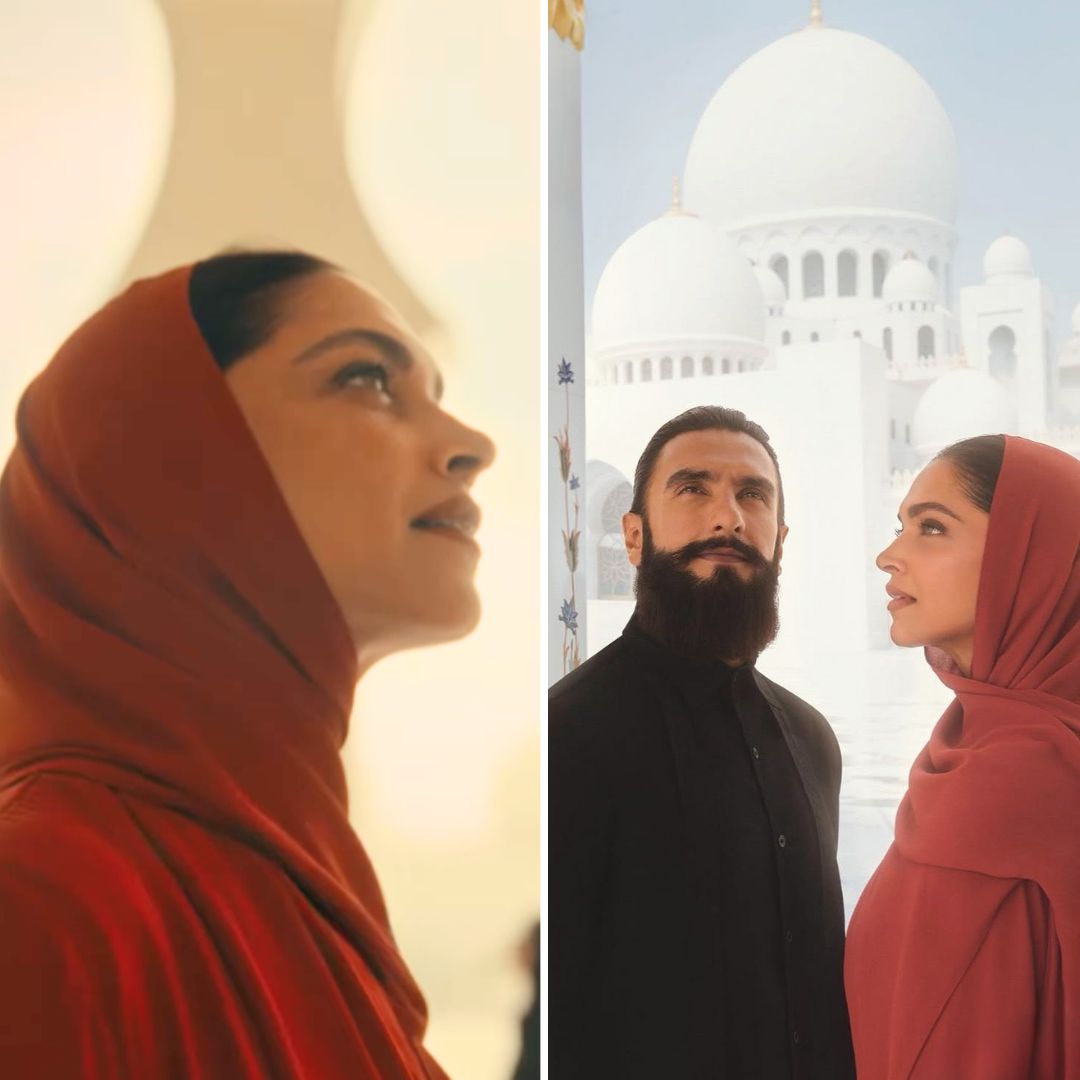Bollywood icon Deepika Padukone, accompanied by husband Ranveer Singh, recently featured in Abu Dhabi’s tourism campaign, where her appearance in a rust-coloured abaya and headscarf at Sheikh Zayed Grand Mosque set off a torrent of reactions. People, however mistook her attire to be a hijab.
As brand ambassadors for Experience Abu Dhabi, the couple’s video invited admiration for its graceful depiction of Emirati culture, yet simultaneously opened a floodgate of heated debate on social media platforms.
Waves of Support: Respect for Culture
Many users on Twitter and other platforms commended Deepika, calling her attire a mark of cultural respect. Defenders wrote, “She’s showing respect toward another culture, just like we expect tourists to dress decently in Indian temples,” and “She wore a saree to Siddhivinayak. So obviously, she’d wear an abaya in a mosque. People just need drama.”
Some even shared images of Padukone in traditional Indian clothes at temples, arguing that she’s always been considerate of religious norms across countries. Others pointed out that celebrities from the West, such as Rihanna and Christian visitors, also adhere to mosque dress codes. One supporter tweeted, “It’s not appeasement. it’s etiquette. She’s representing India with grace.”
This is Deepika Padukone when she has gone to temples. She has always been respectful toward the culture of India.
— Tony メ𝟶 (@AbelX0) October 8, 2025
In the tourism commercial she is wearing what is appropriate for that culture. You should be proud of someone who can go to any country and be respectful. https://t.co/biIo9kCAnl pic.twitter.com/omjq9n0l0T
It’s a woman’s choice whether she wants to wear a bikini on the beach, a hijab in a mosque, or a lehenga with a choli at weddings.
— Dee (@deebayleaf) October 8, 2025
If you don’t understand this, then the problem is with you, not with women, and definitely not with Deepika Padukone.
By the way, she looks so… pic.twitter.com/FHdTt4P7Rs
Trolling and Criticism: Charges of Hypocrisy
However, another section of the internet sharply criticised Padukone. Right-wing accounts and self-described traditionalists labelled her a “fake feminist,” referencing her 2015 “My Choice” campaign that championed women’s autonomy in attire. One viral tweet mocked, “What happened to ‘My Choice’? Not valid in Abu Dhabi?”. Another detractor commented, “She would wear anything for money.” Critics accused Padukone of inconsistency and performative behaviour, highlighting that she doesn’t appear in similar campaigns for Indian religious sites.
A harsher comment went, “Earn in India, cry patriarchy in India, insult Indian culture and wrap burkha in Abu Dhabi for shaikhs’ money. Don’t come back to India.” These posts reflect ongoing tensions around intersections of pop culture, feminism, and tradition, amplified by social media echo chambers.
Remember Deepika Padukone's video "My Choice"?
— Ankur Singh (@iAnkurSingh) October 7, 2025
"To wear a Bindi or not, my choice"
"I decide the clothes I wear"
Now Deepika Padukone has made video promoting Abu Dhabi tourism wearing Hijab.
What happened to "My Choice"? pic.twitter.com/y6bbIrqGYs
On Hindu Traditions – "My body, My Choice"
— Saffron Chargers (@SaffronChargers) October 7, 2025
But no problem in Wearing ‘Hijab’ for money
This is the reality of Fake Feminists like Deepika Padukone
They are no feminists ..they are just ‘Anti Hindus’ pic.twitter.com/7Uj5ojrGjs
Understanding the Difference: Hijab and Abaya
Amid the ongoing debate, it is important to clarify that Deepika Padukone was not wearing a hijab in the Abu Dhabi tourism advertisement but an abaya, as widely reported in credible media sources. The abaya is a long, loose-fitting robe that covers the entire body except for the face, hands, and feet, and is typically worn over regular clothing to maintain modesty when visiting religious places like mosques in the UAE. In contrast, a hijab refers specifically to a headscarf that covers the hair and neck but not the rest of the body.
The distinction is crucial: while the hijab is an optional head covering, the abaya is part of the specific dress code required for all visitors, Muslim or not, when entering sites such as the Sheikh Zayed Grand Mosque. According to the mosque’s official website and tourism authorities, women must wear attire that is loose-fitting and covers their body up to the wrists and ankles, along with full hair coverage, to show respect for local customs and traditions. This requirement aims to uphold the sanctity and respectful atmosphere of the worship site, a sentiment echoed in the campaign’s intention to celebrate tradition and inclusivity
The Logical Indian’s Perspective
Moments like this are reminders of the importance of empathy, open-minded dialogue, and cultural understanding. Deepika Padukone’s choice of attire should be viewed through the lens of situational respect, not as a polarised battleground of ideologies.
By focusing on kindness, harmony, and coexistence, the media, and the community at large, can nurture a richer conversation about honouring traditions while supporting personal freedom.












